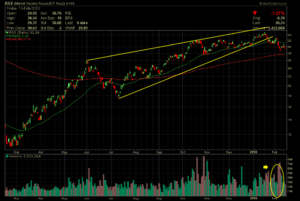
Goldman Sachs coined the term “BRIC” nations in 2001. It was just a cute way of discussing Brazil, Russia, India and China. Being invested in the BRIC nations was all the rage and those that paid attention made some mad cash.
The performance of the BRIC nations has been poor so far this year, they are lower by about 10-15%. Most of our attention lately though has been paid to the P.I.G.S (Portugal, Italy, Greece and Spain). You can throw Ireland and the UK in there too, but they are up north. Don’t get me started on Eastern Europe whose challenges and problems quietly ferment while we focus on the big picture.
I wanted to address Russia, a country whose success or failure is directly pegged to the price of oil and is a train that could really run off the tracks over the next five to ten years.
Is the Russian bear back? Is the move they made on Georgia, their neighbor to the south an attempt to telegraph their military prowess to the world? Are we are the verge of another Cold War?
I highly doubt it and for the following reasons:
Russia’s economy is almost totally dependent on the price of oil. Just a one third drop in the price of oil will paralyze Putin and some of his lofty plans to rebuild his super power status. The attack on Georgia was pulled off with a reluctant and confused cast of soldiers and half the weapons were rusted and outdated.
The physical health of Russia is deteriorating at a rapid if not scary rate. Murray Feshbach of the Washington Post had this to say:
This is a tragedy of huge proportions — but not a particularly surprising one, at least to me. I followed population, health and environmental issues in the Soviet Union for decades, and more recently, I have reported on diseases such as the HIV/AIDS epidemic ravaging the Russian population. I’ve visited Russia more than 50 times over the years, so I can say from firsthand experience that this national calamity isn’t happening suddenly. It’s happening inexorably.
According to U.N. figures, the average life expectancy for a Russian man is 59 years — putting the country at about 166th place in the world longevity sweepstakes, one notch above Gambia. For women, the picture is somewhat rosier: They can expect to live, on average, 73 years, barely beating out the Moldovans. But there are still some 126 countries where they could expect to live longer. And the gap between expected longevity for men and for women — 14 years — is the largest in the developed world.
So what’s killing the Russians? All the usual suspects — HIV/AIDS, tuberculosis, alcoholism, cancer, cardiovascular and circulatory diseases, suicides, smoking, traffic accidents — but they occur in alarmingly large numbers, and Moscow has neither the resources nor the will to stem the tide. Consider this:
Three times as many Russians die from heart-related illnesses as do Americans or Europeans, per each 100,000 people.
Tuberculosis deaths in Russia are about triple the World Health Organization’s definition of an epidemic, which is based on a new-case rate of 50 cases per 100,000 people.
Average alcohol consumption per capita is double the rate the WHO considers dangerous to one’s health.
About 1 million people in Russia have been diagnosed with HIV or AIDS, according to WHO estimates.
Using mid-year figures, it’s estimated that 25 percent more new HIV/AIDS cases will be recorded this year than were logged in 2007.
The Boston Globe reports that over 10 million Russians are sterile due to faulty abortions and a deteriorating and antiquated health care system. Their population is in a state of decline and that is a major hit on their GDP.
Oligarchs are bailing out. Many are heading to London and other countries as they are in fear of the Kremlin taking away their businesses. Some rainmakers in Russia that disagreed with Putin have found themselves in prison and some have died there. They weren’t sent to a Gulag, but some were never seen or heard from again. Great wealth has left left the country and more could be on the runway.
Russia’s economy is now hostage to potential global growth. It is clear why: the state budget depends almost totally on energy prices. Now that the price of oil has reached $80 per barrel, Russia’s central bank can start buying foreign currency again. Gold and foreign currency reserves are increasing, implying appreciation of the ruble. But Russia’s budget for 2010 is still headed for a serious deficit, owing to high spending.-Asia Times
I’m sure Putin is watching crude futures now more than ever.
Subscribe here
